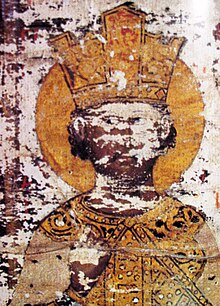Djuradj Brankovic
| Đurađ Branković | |
|---|---|
| By grace of God, Despot of the Kingdom of Rascia and the Lord of Albania | |

Portrait from The Esphigmen Charter of despot Đurađ Branković, issued to the monastery of Esphigmen on Athos in 1429
|
|
| Reign | 1427—1456 |
| Predecessor | Stefan Lazarević |
| Successor | Lazar Branković |
| Born | 1377 |
| Died | 24 December 1456 (aged 78–79) |
| Spouse | Eirene Kantakouzene |
| Issue | Todor Branković Grgur Branković Mara Branković Stefan Branković Katarina, Countess of Celje Lazar Branković |
| House | Branković |
| Father | Vuk Branković |
| Mother | Mara |
Đurađ Branković (pronounced [d͡ʑûrad͡ʑ brǎːŋko̞ʋit͡ɕ]; Serbian Cyrillic: Ђурађ Бранковић; Hungarian: Brankovics György; 1377 – 24 December 1456) was the Serbian Despot from 1427 to 1456 and a baron of the Kingdom of Hungary. He collected a large library of Serbian, Slavonic, Latin, and Greek manuscripts and made his capital Smederevo, a centre of Serbian culture. He was the first of the Branković dynasty to hold the Serbian monarchy.
His father was Vuk Branković and his mother was Mara, daughter of Prince Lazar Hrebeljanović. His wife was a Byzantine princess, Eirene Kantakouzene, a granddaughter of Emperor John VI Kantakouzenos.
Despot Stefan had appropriated for himself properties that were part of the hereditary lands of Vuk, which resulted in Vuk joining the opposition. Vuk entered a pact with the Ottomans when Stefan had left Ottoman service and joined Hungary, fueling the domestic conflict between the two cousins; Vuk befriended Musa, only for revenge. The conflict went on for 10 years. Once reconciled, Stefan tried to make the most benefit of Đurađ, Vuk's son. When Đurađ succeeded Stefan, he was mature with rich experience, aged 50 in 1427.
When Despot Stefan died (19 July 1427), King Sigismund hurried to complete the obligations of the contract regarding Despot Stefan's heir – his nephew Đurađ. From 17 September to 19 November he was in Belgrade, which had been officially ceded to him. At that time, Belgrade was known with the new Hungarian name Nandor Alba and Nandor Fejervar. At the same time, Đurađ returned northern Mačva, and with the king's approval, kept the southern and western part of Mačva with Valjevo, Krupanj and Zajača. Meanwhile, the commander of Golubac, vojvoda Jeremija, was unwilling to execute the command of giving the city to the Hungarians without a sum of 12,000 ducats; when he was declined the sum, he surrendered the city to the Ottomans.
...
Wikipedia
